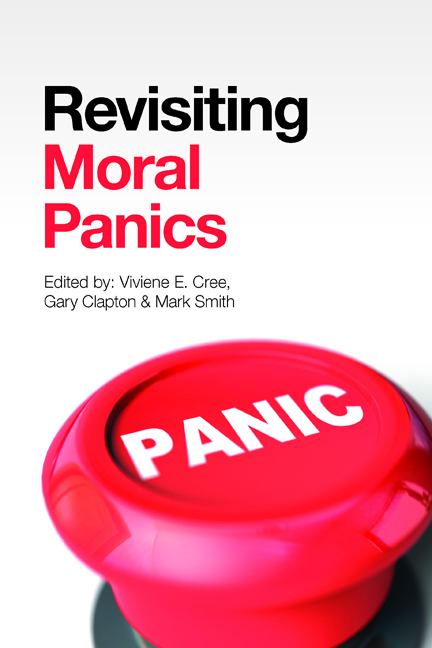Book contents
- Frontmatter
- Contents
- Contributors
- Preface
- Commentary moral panics yesterday, today and tomorrow
- Part One Gender and the family
- Part Two Moral panics in our time? Childhood and youth
- Part Three The state, government and citizens
- Part Four Moral crusades, moral regulation and morality
- Afterword the moral in moral panics
- Conclusion Moral panics and beyond
- Index
Twenty - Assisted dying: moral panic or moral issue?
Published online by Cambridge University Press: 08 March 2022
- Frontmatter
- Contents
- Contributors
- Preface
- Commentary moral panics yesterday, today and tomorrow
- Part One Gender and the family
- Part Two Moral panics in our time? Childhood and youth
- Part Three The state, government and citizens
- Part Four Moral crusades, moral regulation and morality
- Afterword the moral in moral panics
- Conclusion Moral panics and beyond
- Index
Summary
Introduction
This chapter interrogates a phenomenon that, although not a new issue, has captured the public's attention in recent years. The controversy about assisted dying is concerned with whether or in what circumstances it is right for someone to assist another person in committing suicide or otherwise hastening the process of dying. Physician-assisted suicide (PAS) refers to assistance by healthcare professionals. Assisted dying has been a constant in medical ethics. The Hippocratic Oath of the ancient Greeks, for example, required ethical doctors not to ‘give a lethal drug to anyone if I am asked, nor will I advise such a plan’ (North, 2002). The Oath came to be seen as a general interdiction against assisting patients or others who wished to use medical expertise to die.
After anaesthetics were developed during the 19th century, some doctors advocated using them to relieve pain in the dying phase of life, debates about the ethics of euthanasia raged and there were attempts at legislation (Emanuel, 1994). During the first part of the 20th century, the issue was raised again, in particular by the rise of eugenics and mental hygiene movements, culminating in the rejection of such ideas after the experience of widespread mortality in two world wars, the implementation of eugenic policies by the Nazi regime and the Holocaust.
The illegality and moral unacceptability of assisted dying is therefore clearly the ‘established’ position in many societies, although this established moral settlement has been challenged by ‘right to die’ groups and individual campaigners, partly because of public opinion. The British Social Attitudes Survey examined public attitudes to assisted dying, using the same question for 30 years; its most recent report finds that there is widespread and growing public support for assisted dying in some form (Park et al, 2013, p ix). So, assisted dying is clearly a moral issue, but is it a moral panic?
UK legal provision
In most legal jurisdictions, euthanasia and assisted dying are illegal. In the UK, murder and suicide were illegal at common law and murder remains contrary to the Homicide Act 1957. The Suicide Act 1961, section 1, decriminalised suicide, but did not establish a right to commit suicide.
- Type
- Chapter
- Information
- Revisiting Moral Panics , pp. 243 - 252Publisher: Bristol University PressPrint publication year: 2015



